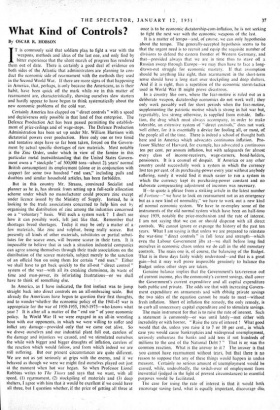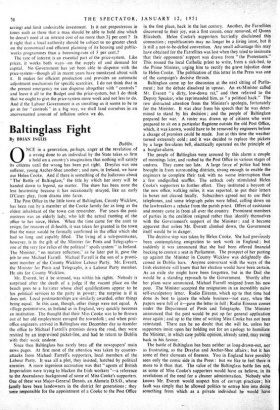What Kind of Controls?
By OSCAR R. HOBSON
IT is commonly said that soldiers plan to fight a war with the weapons, methods and ideas of the last one, and only find by bitter experience that the silent march of progress has rendered them out of date. There is certainly a good deal of evidence on both sides of the Atlantic that administrators are planning to con- duct the economic side of rearmament with the methods they used in the Second World War. If there are more signs of that happening in America, that, perhaps, is only because the Americans, as is their habit, have been quick off the mark while we in this matter of rearmament are, characteristically, showing ourselves slow starters and hardly appear to have begun to think systematically about the new economic problems of the cold war.
Certainly America has clapped on "direct controls" with a speed and decisiveness only possible in that land of free enterprise. The Defence Production Act has been passed permitting the establish- ment of price-ceilings and of wage-stops. The Defence Production Administration has been set up under Mr. William Harrison with dictatorial powers over production. Here only one or two timid and tentative steps have so far been taken, forced on the Govern- ment by actual specific shortages of raw materials. Most notable is the Zinc Order, under which in view of the famine in this particular metal (notwithstanding that the United States Govern- ment owns a " stockpile ': of 500,000 tons—about 21 years' normal British consumption) its employment (alone or in conjunction with copper) for some two hundred "end uses," including pails and dustbins and similar household articles, has been forbidden.
But in this country Mr. Strauss, convinced Socialist and planner as he is, has shrunk from setting up a full-scale allocation scheme under which no manufacturer could procure zinc except under licence issued by the Ministry of Supply. Instead, he is looking to the trade associations concerned to help him out by organising the distribution of zinc among the industries concerned on a " voluntary " basis. Will such a system work ? I don't see how it can possibly work, left just like that. Remember that shortages breed shortages. Today it may be only a matter of a • few materials, like zinc and sulphur, being really scarce. But presently all kinds of other materials, substitutes or partial substi- tutes for the scarce ones, will become scarce in their turn. It is impossible to believe that in such a situation industrial companies can agree among themselves through their trade associations on the distribution of the scarce materials, subject merely to the sanction of an official ban on using them for certain "end uses." Either we shall have to get back quickly to the all-out "direct control" system of the war—with all its creaking clumsiness, its waste of time and man-power, its infuriating frustrations—or we shall have to think of something else.
In America, as I have indicated, the first instinct was to jump straight back into direct controls on an all-embracing scale. But already the Americans have begun to question their first thoughts, and to wonder'whethcr the economic policy of the 194145 war is appropriate for the war of 1950-1955, 1965-1975—who knows what year ? It is after all a matter of the "end use" of your economic policy. In World War II we were engaged in an all-in wrestling bout with our opponents, in which we were willing to suffer and inflict any damage—provided only that we came out alive. So we drove ourselves and our industrial plant full out, careless of the damage and injustices we caused, and we stimulated ourselves the while with bigger and bigger draughts of inflation, careless of the reaction which would follow, and from which indeed we are still suffering. But our present circumstances arc quite different. We are not as yet seriously at grips with the enemy, and if we behaved as though we were we might find ourselves played out just at the moment when hot war began. So when Professor Lionel Robbins writes to The Times and says that we want, with all speed, (1) r9rmament, (2) stockpiling of materials and (3) deep shelters, I agree with him that it would be excellent if we could have all three, but I question whether, if the price of getting all three at
once is to be economic dictatorship-cum-inflation, he is not seeking to fight the next war with the economic weapons of the last.
It is a matter of tempo—and, of course, we can only hypothesise about the tempo. The generally-accepted hypothesis seems to be that the urgent need is to recruit and equip the requisite number of divisions to defend the eastern frontier of Western Germany, and that—provided always that we are in time thus to stave off a Russian sweep through Europe--we may then have to face a long- drawn-out struggle for economic mastery. If that assumption should be anything like right, then rearmament in the short-term sense should have a long start over stockpiling and deep shelters. And if it is right, then a repetition of the economic storm-tactics used in World War 11 might prove disastrous.
In a country like ours, where the fear-motive is ruled out as a deliberate weapon, dictatorship economics do not work well ; they only work passably well for short periods when the fear-motive, supplementing the patriotic motive which is strong in hot war but, regrettably, less strong otherwise, is supplied from outside. Infla- tion, the drug which must always accompany, in order to make tolerable, an extensive system of "direct controls," does not work well either, for it is essentially a device for fooling all, or most, of the people all of the time. There is indeed a school of thought both here and in America which advocates continuous inflation. Pro- fessor Slichter of Harvard, for example, has advocated a continuous ten per cent, per annum inflation, but with safeguards for almost every class of income-receivers, wage-earners, bond-holders, pensioners. It is a counsel of despair. If America or any other country could successfully work a system in which the currency lost ten per cent, of its purchasing-power every year without anybody suffering, surely it would find it much easier to run a system in which the currency kept its purchasing-power constant and no elaborate compensating adjustment of incomes was necessary.
If—to quote a phrase from a striking article in the latest number of Fortune—" we have to look on rearmament not as an emergency but as a new kind of normality." we have to work out a new kind of normal economic system. We have to re-employ some of the instruments of the old normal system which have been on half-time since 1939, notably the price-mechanism and the rate of interest.
I am not saying that we can or should dispense with all direct controls. We cannot ignore or expunge the history of the past ten years. What I am saying is that unless we are prepared to reinstate the war-time "direct controls" in full force and strength—which even the Labour Government jibs at—we shall before long find ourselves in economic chaos unless we do call in the old monetary controls. The main one is, of course, the balancing of the Budget. That is in these days fairly widely understood—and that is a great gain—but it may well prove impossible genuinely to balance the Budget unless other steps are taken.
Genuine balance implies that the Government's tax-revenue out of current income, plus the community's current savings, shall cover the Government's current expenditure and all capital expenditure both public and private. The odds are that with increasing Govern- ment expenditure on armaments and with ebbing private savings the two sides of the equation cannot be made to meet—without fresh inflation. Short of inflation the remedy, the only remedy, is to curb all unnecessary capital expenditure and to stimulate savings. The main instrument for that is to raise the rate of interest. Such a statement is commonly—or was until lately—met either with incredulity or with horror. "Raise the rate of interest I What good would that do, unless you raise it to 7 or 10 per cent., in which case you would cause bankruptcies and widespread unemployment, seriously embarrass the banks and add tens if not hundreds of millions to the cost of the National Debt ? " That is or was the
common reaction. What is the answer to it ? The answer is that you cannot have rearmament without tears, but that there is no reason to suppose that any of these things would happen in undue
measure. Certainly no serious amount of unemployment would be caused, while, undoubtedly, the switch-over of employment from inessential (judged in the light of present circumstances) to essential purposes would be facilitated.
The case for using the rate of interest is that it would both encourage saving (and, what is equally important, discourage dial saving) and limit undesirable investment. Is it not preposterous in times such as these that a man should be able to hold zinc which he doesn't need at an interest cost of no more than 31 per cent ?' Is it right that a local authority should be subject to no greater check on the economical and efficient planning of its housing and public- works programmes than a borovving-rate of 3 per cent.?
The rate of interest is an essential part of the price-system. Like prices, it works both ways—on the supply of and demand for capital. No Government has yet been able to dispense with the price-system—though all in recent years have monkeyed about with it. It makes for efficient production and provides an automatic adjustment mechanism for specific scarcities. I do not think that in the present emergency we can dispense altogether with " controls " and leave it all to the Budget and the price-system, but I do think that we ought to give the price-system more work and not less to do. And if the Labour Government is as unwilling as it seems to be to go in for " controls " in a big way, we shall land ourselves in an ancovenanted amount of inflation unless we do.



































 Previous page
Previous page